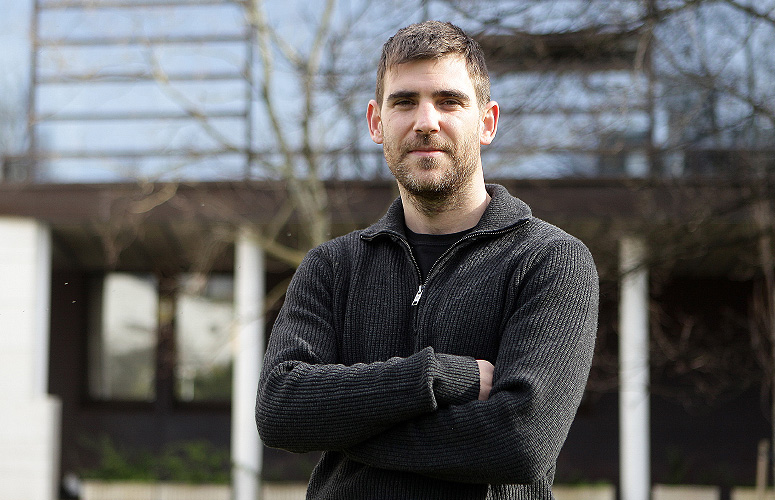A member of the Culture, Cognition and Emotion research group at the UPV/EHU-University of the Basque country has explored how social identification with Basque speakers and collective psychological empowerment relate to personal and social wellbeing and community participation. Individuals who experience a high degree of identification with Basque speakers and a high degree of empowerment have been seen to display higher indices of wellbeing.
-

Ferreirak eta Bengoetxeak beren programak aurkeztu dituzte UPV/EHUko Klaustroan
-

UPV/EHUko 19 diziplina, munduko 500 onenen artean, Shanghaiko rankingaren arabera
-

Zientzia, Ingeniaritza eta Arkitekturako monografiarik onena
-

Medikuntza birsortzailearen etorkizunari buruzko gakoak
-

Beste pertsona bat al gara beste hizkuntza bat hitz egitean?
Basque ethnic identity and collective empowerment are associated with wellbeing
A study reveals that individuals with a high degree of Basque identity and collective empowerment display high levels of wellbeing and community participation
- Research
First publication date: 23/02/2021

Social identity is a factor linked to wellbeing and community participation. Various studies have demonstrated the link existing between ethnic identity and empowerment and that the interaction between both of them leads to a rise in the indices of wellbeing and community participation. However, the nature of these relationships may be determined by the fact that the individual perceives his or her own group as a minority one and/or one that is subject to discrimination. In fact, these relations emerge mostly in groups that find themselves in a minority situation and/or one of discrimination, but not in groups that are more hegemonic or in the majority.
To further this thesis, Jon Zabala, a member of the Culture, Cognition and Emotion consolidated research group at the UPV/EHU’s Faculty of Psychology, conducted a transversal study “to explore the relationship that social identification (or identity fusion) and psychological collective empowerment have with personal wellbeing, social wellbeing and community participation of 748 Basque men and women".
As Zabala explained, “we saw that the individuals who feel closely identified or fused with Basques (or Basque speakers) and have a high degree of empowerment display high indices of personal and social wellbeing and community participation; in fact, they display indices higher than those of people who are not fused and who have a low degree of empowerment”. Yet the results of the research suggest that “social identification balances the negative aspects arising out of perceiving the group as a linguistic minority", asserted the author. In addition, “we found that with respect to the wellbeing of individuals who regard being euskaldun (Basque speaking) as being in a minority in their environment, such as in cities or locations where the Basque language is more precarious, it is more important to feel identified with Basques".
Collective psychological empowerment
As the researcher pointed out, the advances achieved in cultural terms, and in particular in linguistic ones, are clearly consistent with the perception of the power of the Basque collective to change society and achieve its aims. However, “we still come across certain indicators of vulnerability, such as the precarious situation of the Basque language, and certain specific indicators of linguistic discrimination in certain situations, which may be regarded as a threat to the survival of Basque and, therefore, to Basque identity”, said Zabala.
According to the theory of social identity, “when a collective is a minority one and perceives significant threats that may have to do with its identity, the identity is activated and may trigger empowerment processes,” said the Faculty of Psychology researcher. ”It may be that, despite the generally good socioeconomic position of this social group and the achievements reached in terms of the language, the awareness of being a linguistic minority, both in the world and within the population of the Basque country as a whole, contributes towards the fact that the degree of identification or identity fusion with Basque speakers and, especially, empowerment, act as particularly important factors for wellbeing.”
The researchers perceived a strong link between collective empowerment and wellbeing. “We were surprised that a social factor like this should be so strongly associated with personal wellbeing,” said Zabala. "Collective psychological empowerment was a highly significant factor and we need to further the research”. The characteristics of the collective studied are not common in comparison with the studies carried out to date in this matter (the ethnic identity of African Americans has been studied above all). So the researchers assert that this work will be of use for other pieces of research that are conducted in this field worldwide.
Additional information
This study was conducted within the framework of the PhD thesis by Jon Zabala in the Culture, Cognition and Emotion research group at the UPV/EHU’s Faculty of Psychology, and was supervised by the lecturers Aitziber Pascual-Jimeno and Susana Conejero-López. The AEK association collaborated in the data-gathering work. The study was conducted with support from the pre-doctoral programme of the Department of Education of the Basque Government.
Bibliographic reference
- Basque Ethnic Identity and Collective Empowerment: Two Key Factors in Well-Being and Community Participation
- Frontiers in Psychology
- DOI: 10.3389/fpsyg.2020.606316


